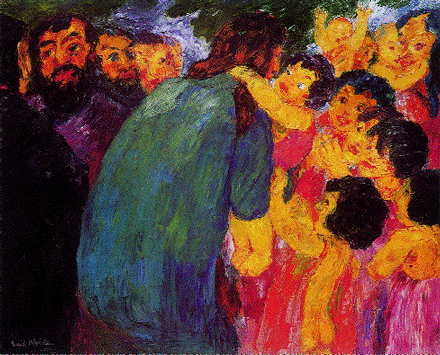


The encounter of Jesus with the Syrophoenician (or Canaanite) woman in Mark 7: 24-30 is an opportunity to see Jesus wrestle with his humanity and his purpose. He is tired. He has just spent time fussing with the Pharisees and scribes about purification and eating with dirty hands. I can only imagine how mentally and physically draining those encounters must have been. He has been walking, healing, teaching, and now tries to duck into somebody’s house in Tyre for some peace. Just for a few precious quiet moments. And before he can get in the house good, here comes a Syro-Phoenician woman wanting a demon cast out of her daughter. The text tells us this woman was a Gentile, a term used in the ancient world to describe someone who is not Jewish. And Jesus says something to her that is troubling: “let the children be fed first, for it is not fair to take the children’s food and throw it to the dogs.” (Mk. 7:27, NRSV)
Did Jesus just call her what we typically associate with females and dogs? Has his fatigue made him lose his decorum? Many scholars believe Jesus is telling this woman that his charge to keep is only for the people of Israel. But didn’t Jesus just heal a Gerasene man (Legion) in Mark 5? How do we explain Jesus’ rebuff of this woman? Did she catch him on a bad day? Or was he being intentionally provocative to make a point? I’m going to make a case for the latter. The Gospels give us several examples of Jesus using exaggeration to make a point. Jesus asking how it is we can see the toothpick in someone else’s eye while missing the two by four in our own is a good example. Jesus was known to make outrageous claims about how we should treat people, like treating people as we want to be treated and loving people out to get us as we love ourselves.
Jesus loves a good teaching moment, and there are several here to glean:
If you have ever been a member of a church committee, you know the seven words that can paralyze progress at any meeting: “we’ve never done it that way before.” Jesus’ encounter with the Syro-Phoenician woman reminds us that sometimes the way we do ‘church’ must change to accommodate the needs of hurting people. This is a point Jesus made repeatedly with the religious leaders of his time. And her words to him, “Sir, even the dogs under the table eat the children’s crumbs” (v. 28), reminded Jesus that even his mission could be done differently. She clapped back against him to make the point that Syro-Phoenician lives matter.
Jesus’ encounter with the Syro-Phoenician woman reminds us how important testimony is. This woman heard about Jesus from someone, and what she heard about him was enough to motivate her to seek him out. She may not have been a Jew, but she knew Jesus had something she needed because somebody told her so. The person who told the Syro-Phoenician woman about Jesus helped get her daughter healed.
And here is a tough one: what if we consider the text’s use of “dogs” as a metaphor for “different”? As Black American women, we are well acquainted with the use of animal slurs as a put down. Mules. Monkeys. Heifers. Who didn’t feel a little stab in the heart when that guy called Mary Jane Paul a monkey in “Being Mary Jane?” In some churches, there is little tolerance for the different. In extreme cases, those who are considered “different” are also deemed unworthy of the Gospel message. The first thing we learn about this woman is that she is different. She is identified from her geographical residence, as a Syro-Phoenician, and she is identified as a Gentile…both markers which let us know she is different from Jesus. Yet, he puts his self-care retreat on hold to hear her out. He extends the courtesy of listening to her argument. He does not condemn or chastise her for pushing back against his mission statement. In the end, Jesus gives her what she requested, and the demon leaves her daughter.
Was Jesus being mean, or was he demonstrating tolerance to his followers? We cannot be certain. But we can see that she succeeded in getting Jesus to broaden his target audience. And if Jesus could re-evaluate, re-examine and reconsider how he ministered to someone different, surely we can do likewise.